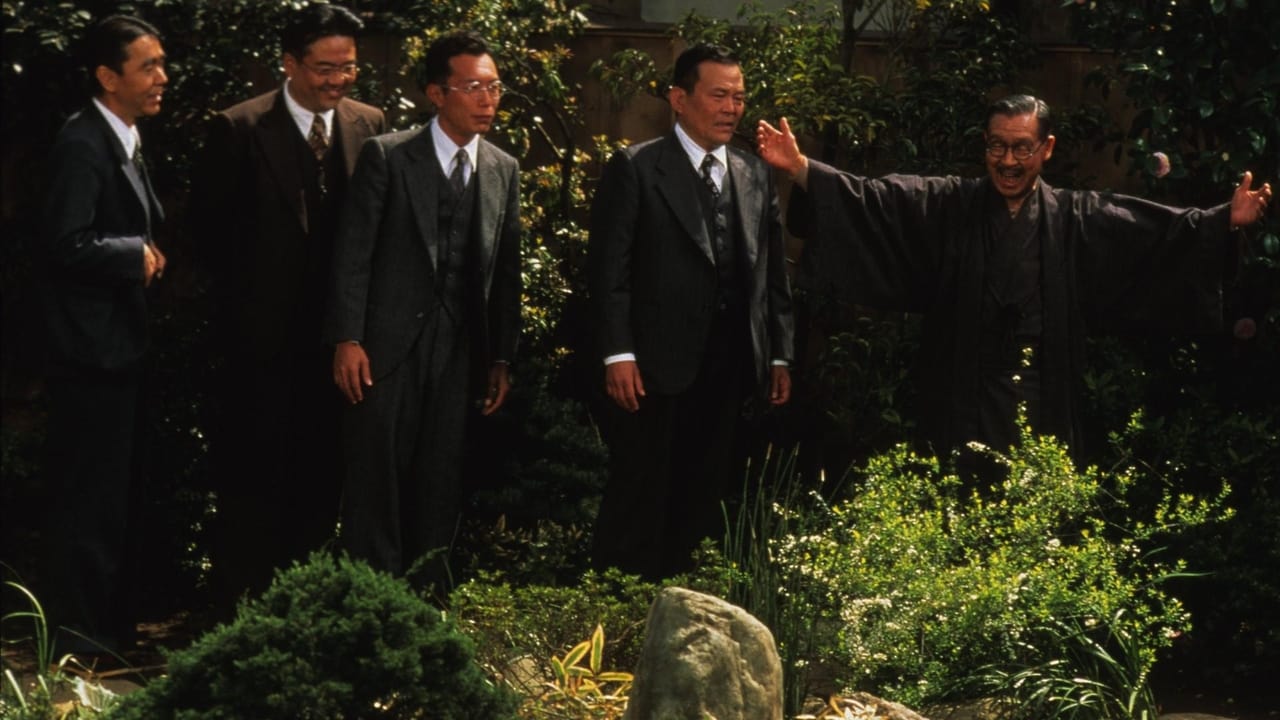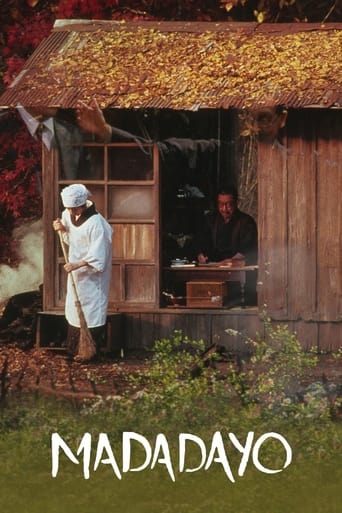

Good idea lost in the noise
... View MoreThe movie's neither hopeful in contrived ways, nor hopeless in different contrived ways. Somehow it manages to be wonderful
... View MoreOne of those movie experiences that is so good it makes you realize you've been grading everything else on a curve.
... View MoreThe film's masterful storytelling did its job. The message was clear. No need to overdo.
... View MoreThe question 'are you ready, are you ready to die?' is answered, as a commonplace, in the negative. Who of us is ready to die? None. Even old age, the harbinger of defeat, cannot accept the fate it portends: an untimely death, for all death is untimely. There is acceptance of death, sure, but no one, save the seldom few who are most miserable, invites it into their home. To me it is a truism that there is nothing more lucid and apparent and viscerally vocal than our united cry - Madadayo! But there is something more at play in this film than this pithy commonplace, something deeper. It is a masterpiece, and one sadly overlooked in his dense oeuvre.Why are you not ready to die? Here is the broader and more philosophical inquiry at the heart of this movie; and I invite you to look into your own life and recall the opulence of emotion in your most miserable moments, and to ask yourself unflinchingly why, if the egregiousness truly stacks above your head, like the loss of a beloved cat named Nora, do you continue to live in this world. What is the cause behind your proclamation - Madadayo! Is it affirmative, or is it a resignation? Misery befalls us all. But is misery all there is? Of course not, and Kurosawa rightly thinks not: "There is an enviable world of warm hearts." The professor tells it to us himself: he would have sunk into the mire of his despair had it not been for the kindness and generosity of his friends and relatives, and even those strangers unfamiliar with his plight.He has a crisis when he loses the cat and another one in the shack. Both times he is saved by his friends. There is much that happens in a man's life, much of it good, much ambivalent; he sees many evils and performs some, regrettably, himself.But the answer is there, in our lives, staring us in the face. Why are you not will to say you are ready for death? The world of warm hearts is astoundingly beautiful. It is beautifully portrayed in the movie, with heartfelt earnestness in the manner in which the students revere and support their professor; but, more to the point, it is also intrinsically beautiful. In the final scene the professor, now an old man, dreams himself a boy, a remembrance perhaps, and finds himself playing a game of hide and seek with some friends on a farm among conical stacks of hay. The boys on the road call out to him continuously, are you ready? as he tries to find a suitable hiding place among the hay. Madadayo (not yet) he exclaims to them. He then slowly covers himself with hay and just as he is about to say that he is ready for them (ready for death) the sun sets over the horizon of a surreal landscape imbued with green, orange and red, a multicoloured dream, and the camera pans up and over the sky, and it is here that we see the beauty of the world; it is this beauty, which is joined with the ethical, the kindness of people, that stops the young boy and the old man from saying that they are ready; it is this solemn beauty that keeps us all going, if we should choose, in our carousals and sojourns, to take notice of it. You are left with a broad smile on your face as you take leave of this master, and every time I think about him I am happy for the life he lived and sad that he departed us so soon.
... View MoreWhile not a perfect film, this story about a bunch of former students of a retired professor who not only still see him after he retires but hold banquets for him and help him build a new home that was burned in the air raids during the war is very touching. This sense of love for the man who shaped them all is told simply, unhurriedly and with no regard for speed of the narrative. That it is truly Kurosawa's final film, it is an interesting project. This could have been a film about a group of film makers lauding and revering Mr. Kurosawa. Again, it is not a fast moving film, but it has a wonderful sentiment and it somehow seems to be the cap of a brilliant career as a director. I recommend it and while you watch it think of a professor or other person who would warrant this kind of respect. That helps to make it an even better viewing experience.
... View MoreMadadayo (1993) was the last film written and directed by the great Akira Kurosawa. Sadly, although the movie bears touches of Kurosawa's genius, it is not a truly memorable film.The plot follows the life of a kindly professor, who retires from teaching but who is revered, respected, and almost worshiped by his former students. The problem for me was that we see the professor's many child-like foibles--which the students don't appear to mind--but we never see any evidence of the professor's greatness.The professor taught German, not philosophy or religion, so the subject matter of his lectures couldn't have been inherently inspiring. We are never told what he said within or outside of class that brings about the fervent admiration of his students.After the professor retires, he suffers a series of unpleasant incidents--some serious and some trivial. In each case he students come together to help restore his life to balance. In addition, they have a highly formalized party on his birthday each year. Eventually they include their wives, children, and grandchildren in these laudatory ceremonies.The film is not boring, and it excels in the crowd scenes as well as in the scenes of wartime destruction, but it never provides a central core of substance that would have made the details and incidents meaningful.We saw this film at the excellent Dryden Theatre at George Eastman House in Rochester. However, most of the action takes place indoors, and I'm sure the movie would work well on the small screen.
... View MoreA fitting conclusion to Mr Kurosawa's career. Full of quiet melancholy and contemplation this film is, in my opinion, quite aware that it is the director's last. It deals solemnly with death, love, admiration and loyalty. Madadayo meaning not yet, tells the story of a retired German grammar teacher whose small group of devoted students grows exponentially every year along with the parties and gatherings in honour of him. The silence in the film allows the relationships between the characters to become gripping and though there is little action the audience begins to care about the teacher as much as the students. The film also contains just the correct amount of humour to counteract the more melancholic, contemplative elements of the story. My only main criticism is that the segment dealing with the lost cat is perhaps just slightly too long. While contributing greatly to the pathos in the film I believe if this part of the film were shortened by a little balance would be restored between pathos and merriment.
... View More